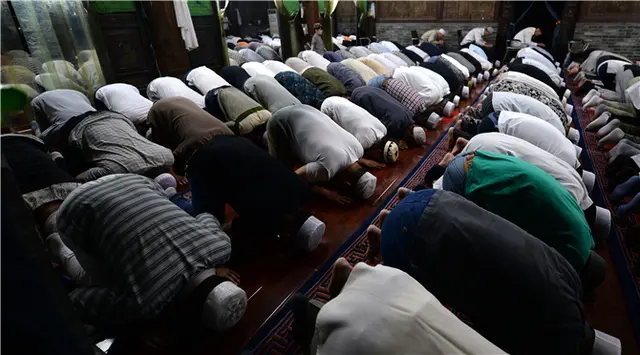The holy month of Ramadan is a festal season of spirituality and an occasion where family members share the usually delicate Iftar (evening breakfast) meals immediately after sunset. But for many hard-hit Gazans, this Ramadan has the smell of destitution.
While the public market of al-Zawya in Gaza city's downtown was full of people, who came for shopping to prepare for the fasting month of Ramadan that started on Monday, Fayez al-Bitar, a fruits vendor, wasn't fully satisfied due to his weak purchasing power.
The 64-year-old fruits vendor complained that buying fruits and other stuff such as food products, dates and dairy products in the first day of Ramadan wasn't positive, due to a deteriorating economy and high rates of unemployment and poverty in the Gaza Strip, the narrow enclave with around two million populations.
Understanding the hard living condition of the populations, not only al-Bitar, but also all other vendors of different kinds of products in Gaza markets announced earlier this week the promotions with discount prices.
"Even the sales campaigns didn't help to flourish and boost the purchasing power in the markets," said al-Bitar, adding "the shelves into stores are filled with so many different kinds of products for Ramadan, but the problem is that people don't have enough cash to buy all what they need for this month."
During the month of Ramadan, Muslims abstain from eating and drinking from dawn to dusk.
Saeed Taleb, a shopper in a Gaza market, told Xinhua that "the economic conditions are very tough and the Israeli blockade has made things even worse because it has helped increase unemployment and consequently poverty."
In 2006, Israel imposed a blockade on the Gaza Strip, but in 2007, Israel considered the coastal enclave a hostile entity and had tightened the blockade after Islamic Hamas movement had violently seized control of the territory. The blockade was eased several times, but never been lifted.
Heba al-Naffar, a Gaza housewife, who went for shopping for Ramadan with her son and daughter, told Xinhua that "the prices are reasonable for some goods, but very expensive for others," adding that "this makes people search for the cheaper goods even if the quality is poor."
She went on saying that "today I bought some Ramadan lanterns for the children to bring them some happiness amid these gloomy days," adding that she has to buy four lanterns for her four younger children, and each lantern costs 10 Shekels (about 2.6 U.S. dollars).
Poverty has been notably apparent among most of the Palestinians, mainly laborers who have lost their jobs due to the lack of construction and raw materials caused by the Israeli and Egyptian border closures. International figures showed that the poverty hit 45 percent in the Gaza Strip.
According to international organizations and United Nations agencies, over 60 percent of the people in Gaza live in food insecurity as hundreds of thousands rely on foreign food aid. A report by the World Bank said the Gaza Strip ranks third across the Arab region in terms of poverty rates after Sudan and Yemen.
(APD)
 简体中文
简体中文



